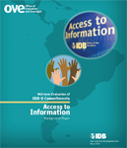IDB-9: Access to Information
Date
Mar 2013
Following up on the IDB-9 commitments, the Inter-American Development Bank (IDB, or Bank) established a new Access to Information Policy that took effect on January 1, 2011. The new policy was expected to match international best practices and to increase the overall transparency of the Bank, strengthening its governance and development effectiveness. This review assesses the extent to which the access to information reform has been fully and effectively implemented. The review finds that the new policy largely matches best practices in comparator institutions, with, however, one provision that is unique to the IDB policy and inconsistent with the core principle of transparency: a broadly written exception to disclosure of country-specific information to which a country objects. As evidence of country use of this exception already suggests, this exception could completely undermine the access to information reform endeavor. The policy cannot be implemented effectively unless the country-specific exception is narrowed. Overall, the Bank is in the process of fully implementing the Access to Information Policy. Implementation progress has been substantial in the key areas of designing a regulatory framework, training staff, upgrading the Bank's document management system, and establishing governance structures and processes; and issues are being addressed as they become evident. Still, key steps to full and effective implementation remain under way. As a consequence, the effectiveness of the new policy has been significant in relation to the disclosure of key documents (such as Board-related information) but remains limited overall. Important revisions to the Implementation Guidelines have taken much longer than planned, and remain a work in progress. Timely disclosure and improved online access remain challenges. The share of documents made public under the new policy has decreased marginally, and staff and external stakeholders report limited awareness of the new policy. These findings reflect a need to improve IT monitoring systems to ensure policy compliance, expand staff training, broaden the communications strategy, and improve the online accessibility of information. This review offers six suggestions for further actions to advance effective implementation of the Access to Information Policy: (i) revise the policy to clarify that redaction is the remedy for country objections to disclosure of country-specific information, and make explicit that the final decision on the handling of information lies with the Bank, after consultation in cases of country concern; (ii) to be consistent with IDB-9 commitments to disclose project results, include Expanded Project Supervision Reports (XPSRs) in the list of disclosed information for non-sovereign-guaranteed operations; (iii) to effectively monitor policy compliance, establish a mechanism to spot-check the accuracy of document classification; (iv) enhance and launch the planned tracking system for timely disclosure of public information; (v) improve the IDB's website and better integrate the different repository systems to ensure easy and adequate accessibility to the Bank's information; and (vi) identify and track indicators of transparency.



